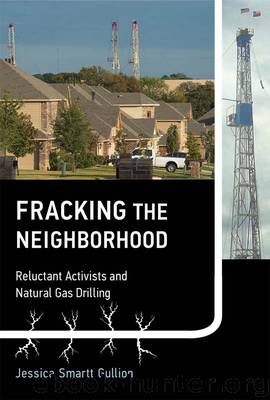Fracking the Neighborhood by Jessica Smartt Gullion

Author:Jessica Smartt Gullion
Language: eng
Format: epub
Publisher: The MIT Press
Published: 2015-10-15T04:00:00+00:00
Fragmentation and Confusion
Frustration with Texas’ fragmented system resonates again and again in the interviews and the fieldwork. “I made some phone calls to our local health department,” one activist said, “and they would pass the buck and give me a [phone] number [to someone else], and they would give me a number, and they would give me a number, and finally I gave up. There’s like . . . It seems like there’s no official place.”
“They don’t give a damn about health,” another activist said, expressing his frustration with city officials. “They know about it and they hide it.” From my vantage point throughout this project, I believe that the issue is not that regulatory officials don’t care—I found many who do—but that they are severely limited in their abilities to respond to complaints. The piecemeal approach to regulation results in confusion over authority, diminished capacity to act, and distrust of the government.
One respondent told me a story about a farmer who had been concerned about naturally occurring radioactive material (NORM) from natural gas activities on his property and who claimed to have found a white powdery substance that was indicative of this sort of contamination: “He asked the Railroad Commission to come bring their Geiger counter to test it. They [the Railroad Commission] told him they lost their Geiger counter. They can’t find it.”
The Railroad Commission regulates the disposal of NORM; however, related health concerns (including issues such as recycling, decontamination, and movement of NORM) are regulated by the Texas Department of State Health Services. This fragmentation of authority is difficult to navigate, and I found instances within the regulatory agencies themselves when an employee did not know which agency was responsible for various aspects of regulation.
These agencies are bureaucracies, and bureaucracies excel at routinization. Procedures for operations are well established and are carried out in the same manner for each client. Because of their very structure, however, bureaucracies do not adapt quickly to change. “All too often,” Gunter and Kroll-Smith write (2007, 88), “communities are caught in the gap between existing procedures and emergent needs. What this is likely to look like from the vantage point of the residents is that no government entity is making any apparent effort to protect them from harm.” The idea that an agency has lost its Geiger counter seems absurd from the perspective of the community member who needs it. From the agency’s point of view, though, it is likely that there are seldom (if, for all intents and purposes, ever) any calls for use of the equipment. The duty is outside of usual operations, perhaps spelled out in a dusty operations manual or in an obscure policy. The equipment, likely to have been purchased to fulfill the policy, was probably put on a shelf and forgotten. Though this does not in any way excuse the agency, it explains the situation.
In another case, an activist told me of trying to get remediation on a problematic waste pit near her home and encountering fragmented authority. She said
Download
This site does not store any files on its server. We only index and link to content provided by other sites. Please contact the content providers to delete copyright contents if any and email us, we'll remove relevant links or contents immediately.
The Lonely City by Olivia Laing(4113)
Animal Frequency by Melissa Alvarez(3750)
All Creatures Great and Small by James Herriot(3508)
Walking by Henry David Thoreau(3228)
Exit West by Mohsin Hamid(3173)
Origin Story: A Big History of Everything by David Christian(3133)
COSMOS by Carl Sagan(2944)
How to Read Water: Clues and Patterns from Puddles to the Sea (Natural Navigation) by Tristan Gooley(2849)
Hedgerow by John Wright(2772)
The Inner Life of Animals by Peter Wohlleben(2763)
Origin Story by David Christian(2677)
How to Read Nature by Tristan Gooley(2657)
Project Animal Farm: An Accidental Journey into the Secret World of Farming and the Truth About Our Food by Sonia Faruqi(2656)
How to Do Nothing by Jenny Odell(2640)
A Forest Journey by John Perlin(2584)
Water by Ian Miller(2579)
The Plant Messiah by Carlos Magdalena(2451)
A Wilder Time by William E. Glassley(2358)
Forests: A Very Short Introduction by Jaboury Ghazoul(2331)
